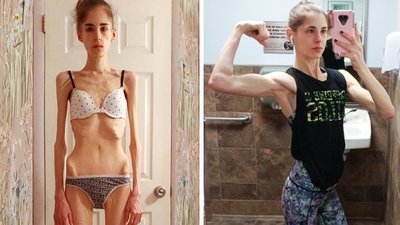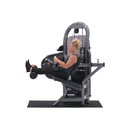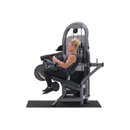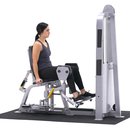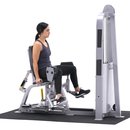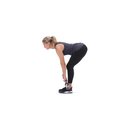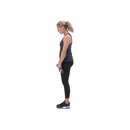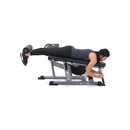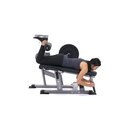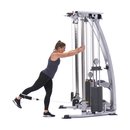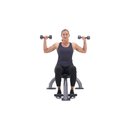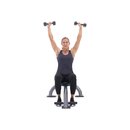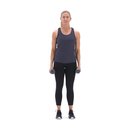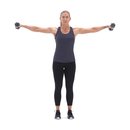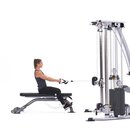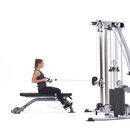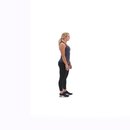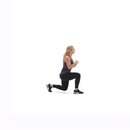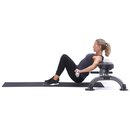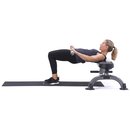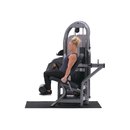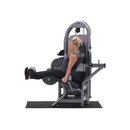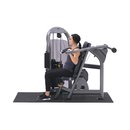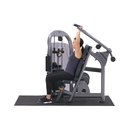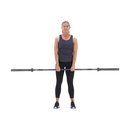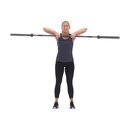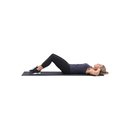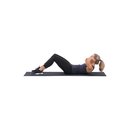Many people don't understand just how hellish an eating disorder is—it consumes your mind, actions, and decisions and affects your long-term health. At least 30 million people in the United States suffer from eating disorders, according to research done by the National Eating Disorder Association. At its root, an eating disorder isn't about food itself, it's about control—or the lack of it.
"When external factors cannot be controlled, people turn to what they can control. In my case, it was food," says Beltz, who admits that she's suffered from anorexia nervosa for more than half her life. From second grade on, she was bullied for being overweight. At age 13, she tried to change the trajectory and began restricting her food drastically.
By the time she was 15, Beltz's eating disorder ran so deep, her parents had her admitted to residential treatment. But after a few months, there were problems with her insurance and she was sent home.
Anyone who has experienced an eating disorder knows that the hardest part is trying to reverse the thought patterns that you develop regarding your body and food. It's a scary voice that's not your own, but it is powerful.
"A lot of it was the struggle of feeling like I was undeserving of food," Beltz says. "I didn't think I was bad enough to seek help."
Rachel took care of herself just enough to survive over the next few years, getting into college and completing her freshman year with a 4.0 average. Still, her condition was getting worse, and she was forced to take a medical leave during her sophomore year.
"I spent the next year or two painting at home, slowing declining," she continues. "My art, which is a huge passion of mine, became really successful, but I couldn't attend galleries, let alone leave my house. I saw what it was doing to my family, too. I chose to seek treatment myself for the first time."
Beltz bounced from treatment center to treatment center, spending time in three more. Some were helpful; some not so much. While it was sporadic, the time she spent in treatment equipped her make changes in her outlook.
By the time she completed her last stint, she was nowhere near recovered, but she was more stable than she had been in years. From there, her recovery came through extensive self-education and, most importantly, a real desire to heal and get strong.
"Now I aim to thrive, not merely survive," Beltz says.
This is her story.
Snapshot: Rachel Beltz
- Height: 5' 8"
- Weight: 115 lbs.
- Occupation: Freelancer, Artist
- Location: West Chester, Pennsylvania
Social Links:
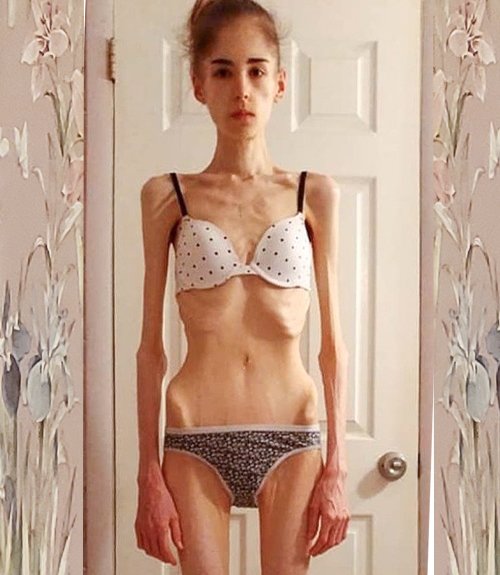
Age: 22, Height: 5'7", Weight: 68 lbs
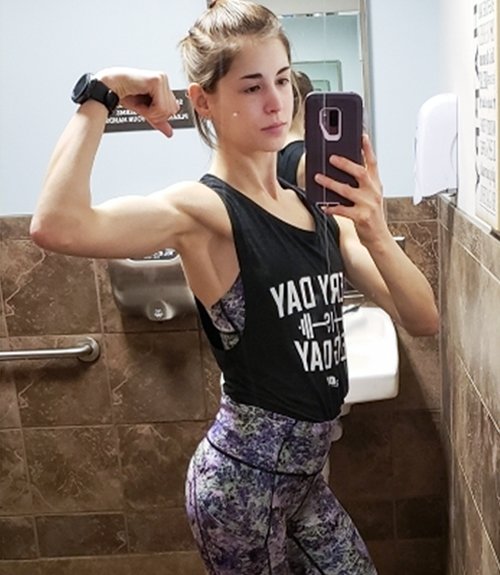
Age: 23, Height: 5'8", Weight: 115 lbs
What was your life like before this transformation?
Prior to treatment, I really didn't have a life. I had become obsessed with destructive exercise, like excessive running and walking. I had always loved to paint and share my artwork, but it no longer brought me joy. I had only left my house four times in the past year. I was just scraping by to survive and obsessing over all the wrong things. I was so tired and didn't want to live.
What made you start to see food as fuel?
This was one of the hardest things to overcome but by far the most important. It was a series of tiny, beautiful discoveries that got me there. The first was learning about macronutrients, understanding the science behind nutrition and what each component does for you, which allowed me to eat more freely. I am learning more and more each day. For example, I just recently discovered that saturated fats are good for you, despite what the fitness "gurus" may say. It's a critical component in hormonal stability.
I also had to learn to give myself reality checks by questioning my inner thoughts. So, if I had the thought, "That sandwich will make you fat," I had to counter it with logic: "Who told you that, and what do they know? Is it scientifically true? No one food will make you fat. Food is fuel."
What was the turning point for you?
Making progress in the gym. I could not lift more if I did not eat more. Accepting that was extremely challenging. I used to tell myself that only other people had to eat more, that if I ate more, it would surely turn to fat. But that just wasn't true. If you want to gain muscle, you need to be in a slight surplus. You cannot make muscle out of thin air.
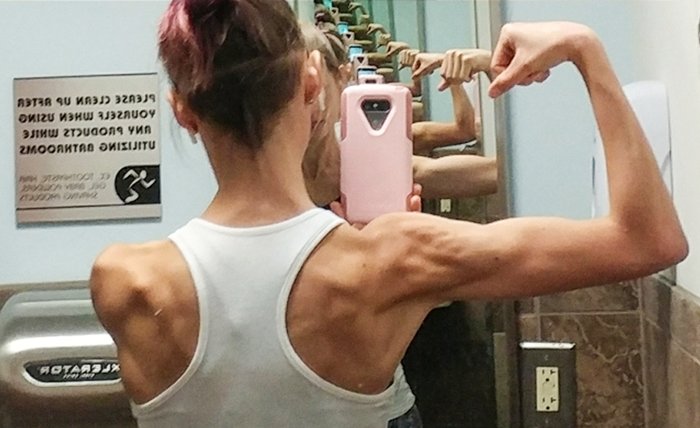
How did Bodybuilding.com help you in your transformation?
Honestly, I was just looking for protein powder. With a quick Google search, I happened to land here, but I left with so much more. Bodybuilding.com has opened many doors for me. I found a community, tons of reviews, well-researched articles—a new outlook on life. The forums are an amazing place to find support. BodySpace is killer for tracking workouts and can serve as a personal trainer if you're lost.
How did you accomplish your goals? What was the first exercise program you tried?
I remember the day I found my first workout program. I was completely lost. I went to the gym, panicked, and left quickly. I had no idea how to use the machines, and I wouldn't dare go to the dumbbells in the back, where the big guys were. That night, I recalled seeing some programs when I was on Bodybuilding.com looking for protein powder. In the end, and it came down to Jim Stoppani's Shortcut to Size or Kris Gethin's 12-Week Muscle-Building Program. I went with Jim's.
BodySpace was the next stepping-stone to more confidence in the gym. I watched all of the follow-along videos, read all of the notes, and I was on my way!
What supplements helped you through your journey?
Before breakfast:
- 25 mg CBD
With breakfast:
- 1 serving Multivitamin
During the workout:
- 5 g NutraBio 100% Pure Glutamine
- 5 g NutraBio 100% Pure Creatine Monohydrate
- 12.8 g Controlled Labs Purple Wraath (essential amino acids)
Post-workout:
- 30 g Dymatize ISO100, Fudge Brownie (in pancakes)
Before bed:
- 5 g Melatonin
What diet plan guided your transformation?
 Eggs
Eggs
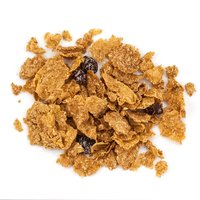 Cereal
(Fiber One)
Cereal
(Fiber One)
 Greek Yogurt
(nonfat)
Greek Yogurt
(nonfat)
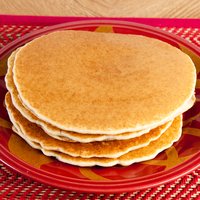 Pancakes
(made with protein powder)
Pancakes
(made with protein powder)
 Popcorn
Popcorn
 Chocolate
(92% dark)
Chocolate
(92% dark)
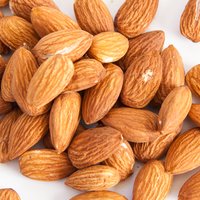 Almonds
Almonds
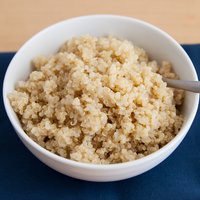 Quinoa
Quinoa
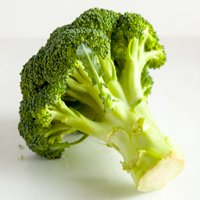 Broccoli
Broccoli
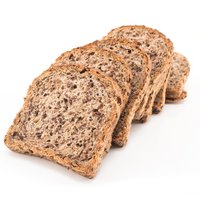 Ezekiel Bread
Ezekiel Bread
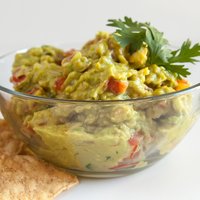 Guacamole
Guacamole
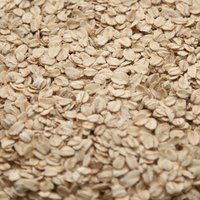 Oats
(old-fashioned)
Oats
(old-fashioned)
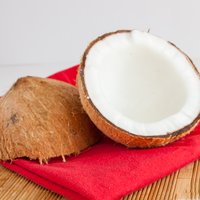 Coconut
(toasted)
Coconut
(toasted)
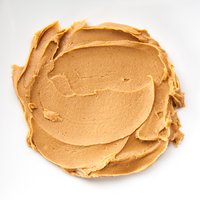 Peanut Butter
Peanut Butter
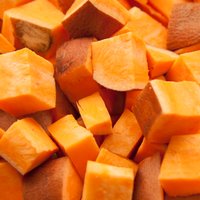 Sweet Potato
(baked)
Sweet Potato
(baked)
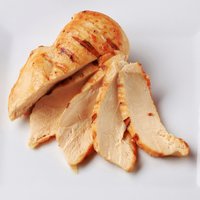 Chicken
Chicken
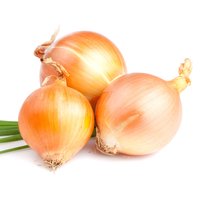 Onion
Onion
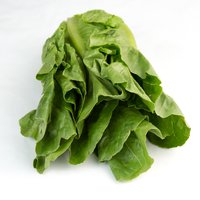 Romaine Lettuce
Romaine Lettuce
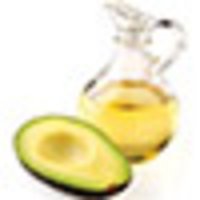 Avocado Oil
(dressing)
Avocado Oil
(dressing)
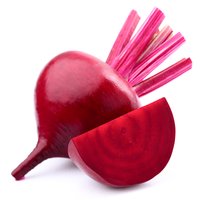 Beets
Beets
 Shredded Wheat
Shredded Wheat
 Greek Yogurt
(nonfat)
Greek Yogurt
(nonfat)
 Strawberries
Strawberries
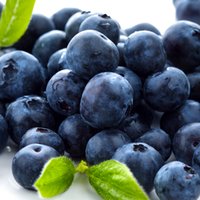 Blueberries
Blueberries
 Peanut Butter
Peanut Butter
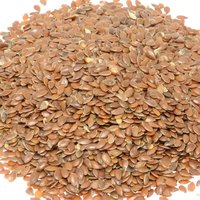 Flaxseeds
Flaxseeds
What did your training and cardio regimen look like?
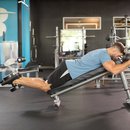
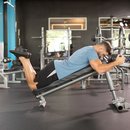
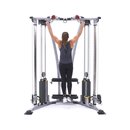
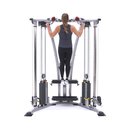
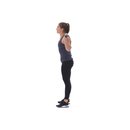
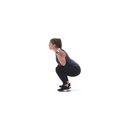
What was the most challenging part of making the change from undereating to building strength?
There is a lot, but the hardest part was letting go of my ego and accepting that my journey would be different. I didn't have the established base that my fellow gym-goers had. I had lost all of the functional muscle I had built during my childhood. I realized that two years ago, when I was having difficulty climbing the stairs or sitting up by myself. If I wanted to do more, I would have to eat more.
As I started to gain muscle, I had to increase my intake. At first this was a challenge, but now I am actually excited to eat more food!
If you could say one thing to someone who is struggling with an eating disorder, what would it be?
It is OK to ask for help. It does not make you weak, pathetic, or anything else that you may call yourself. You cannot do this on your own. Heck, I know I couldn't. I had hundreds of people behind me, pushing me along. Does that make me weak? No. It helped me become a stronger person today, all because I reached out three years ago and got the help that I needed. I still ask for help every single day. You do not have to be the smallest, sickest, or worst off in order to deserve help.
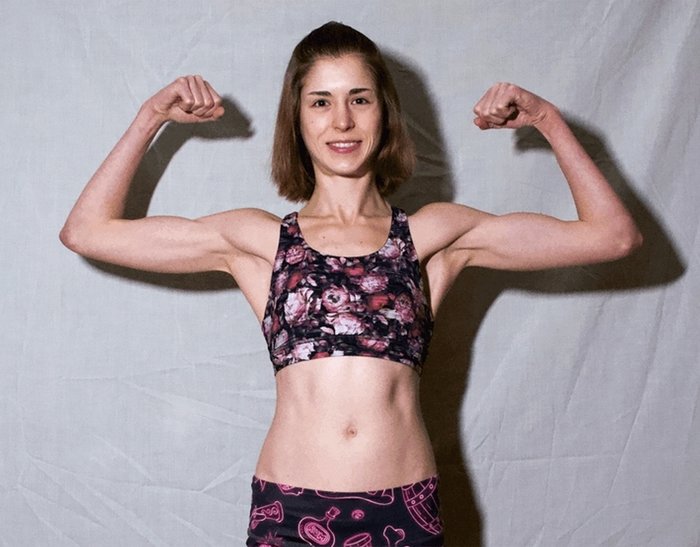
What do you do now for training?
I work closely online with a trainer who lives in Washington. I am aware at this point that doing my own programming could be risky, since it would be easy to fall into the trap of thinking that more is better. That's something I've struggled with in the past. I recommend that anyone who has been through an eating disorder or compulsive over-exercising, known as anorexia athletica, be under the supervision of a trainer who is aware of it. With more time and experience, I think I will be able to develop my own healthy routines.
What are your future goals in the fitness arena?
I would love to win the Bodybuilding.com Transformation Challenge and also to be sponsored by a brand within the fitness industry. I think I could really serve as a voice for the mental health and recovery community.
My goals in the gym have changed a lot over the past few months. Before, my efforts were going toward lifting as much as I could, and, shocker, I ended up injured. Recently, I made a 180-degree turn and have been lifting in a completely different fashion. It was extremely hard for me, but I took a step back and dropped all of my weights. Now, I'm lifting a quarter to half of what I was lifting previously so I can focus on the mind-muscle connection. The main goal is to put on size, and I have made so much more progress this way.
If you're struggling with an eating disorder (or if someone you know is), you're not alone. Check out the National Eating Disorders Association for information, resources, and support.

